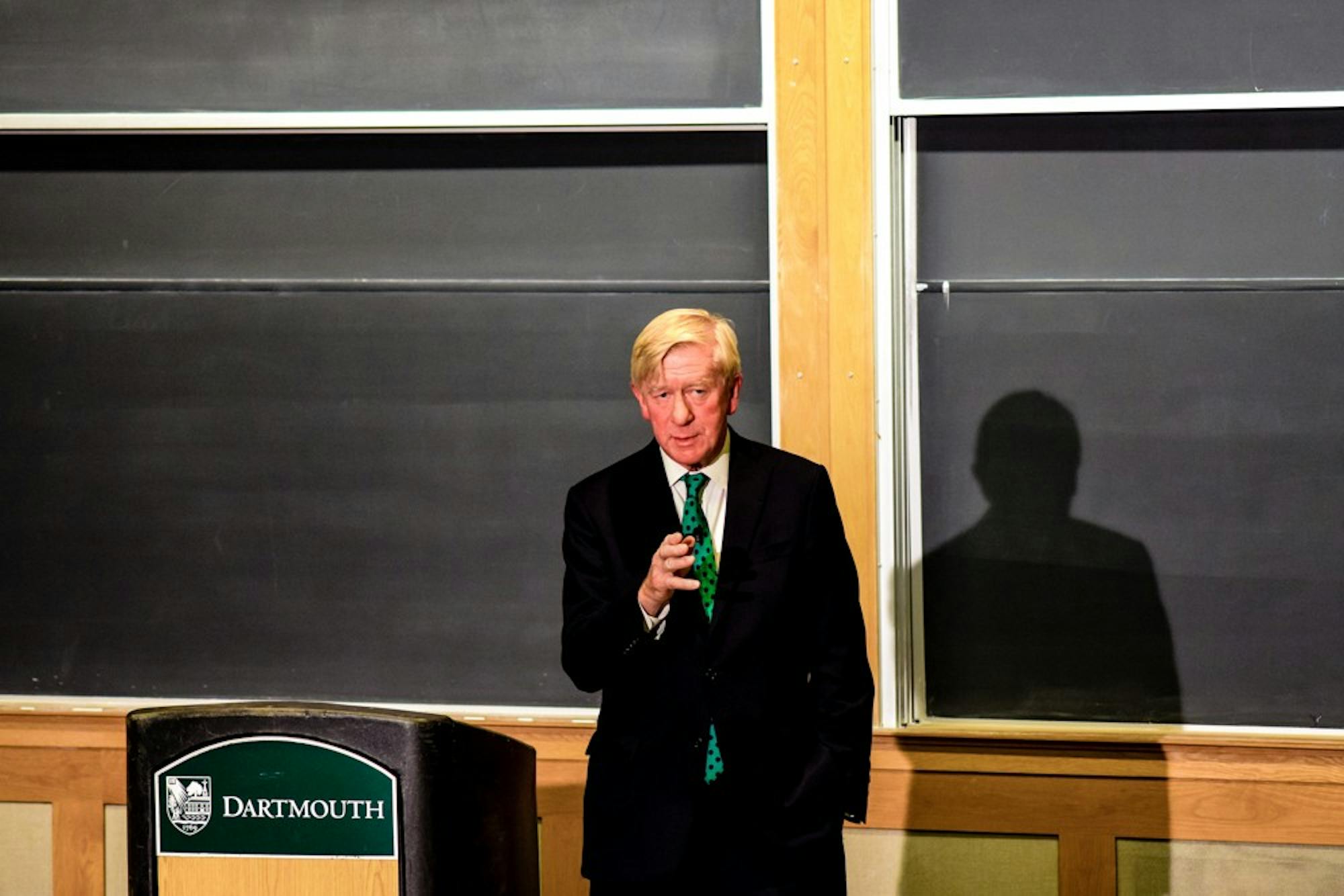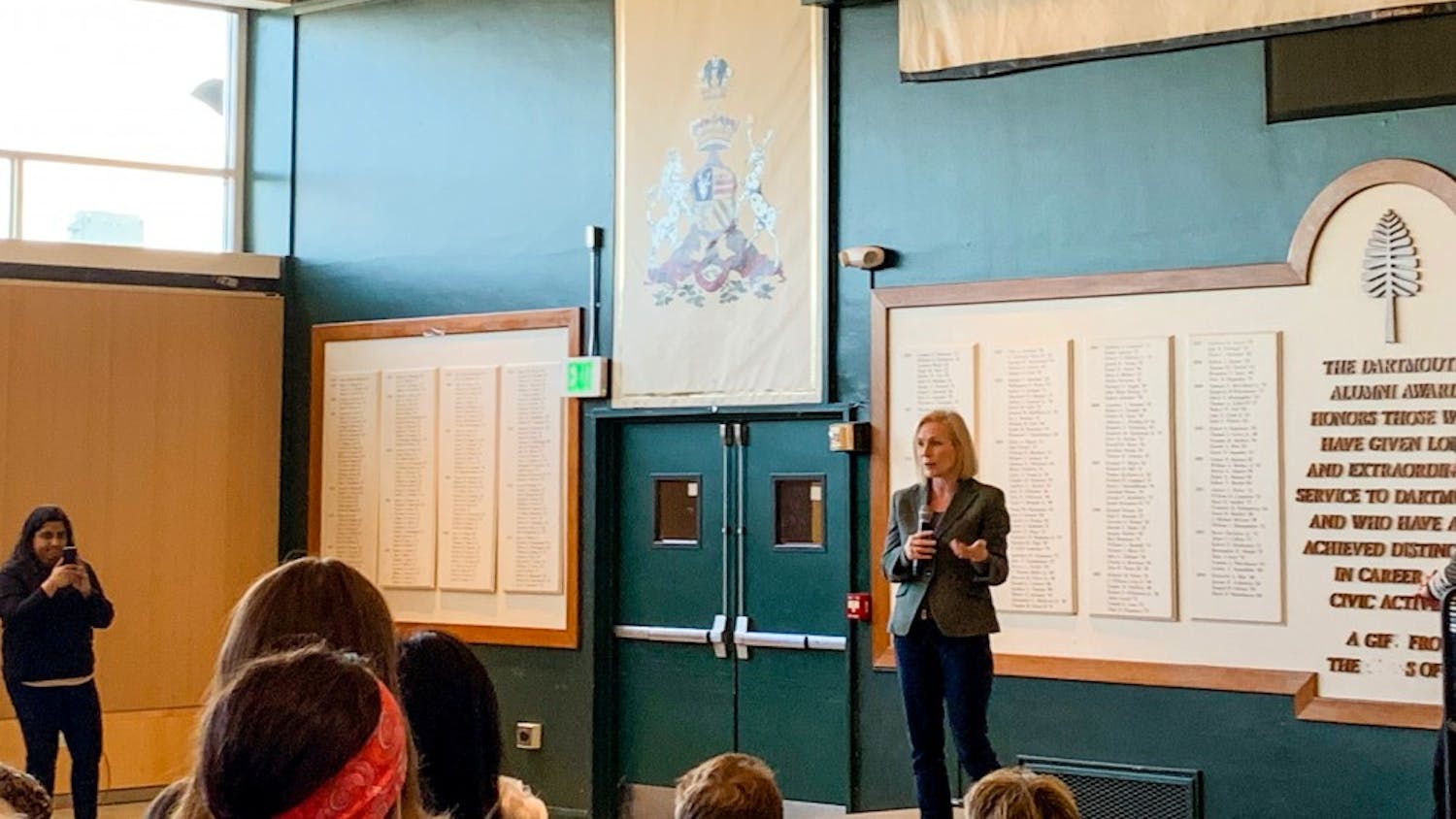Former Massachusetts governor Bill Weld visited campus last Thursday, addressing a group of students, faculty and visitors at a policy event held by the Dartmouth College Republicans in Filene Auditorium. Opening with a brief speech about the importance of climate action, Weld devoted much of the event to answering students’ questions about his platforms and policy views.
The visit comes as Weld, the 2016 Libertarian vice-presidential nominee, embarks on a long-shot bid to unseat President Donald Trump as the Republican nominee for president in 2020. According to recent polls, Weld is running far behind the incumbent, earning no higher than three percent in any national polls in October. In New Hampshire, a recent poll has Weld at 14 percent among Republican primary voters, 57 points behind Trump.
Acting vice-chair of the College Republicans Alexander Rauda ’21 said that the group reached out to the Weld campaign to schedule a visit. Though Rauda said his group has already endorsed Trump for reelection in 2020, he said the organization seeks to promote free speech and an exchange of ideas.
“While we disagree with Weld on many issues, we hold him in high regard,” Rauda said.
Weld announced his candidacy in April and was the first major Republican candidate to declare a run against Trump. In an interview with The Dartmouth, Weld sharply criticized Trump’s view of the press and the “divisiveness” of the country under his leadership.
Rauda said in an interview before the Thursday event that Weld was holding the speech as a policy event, not a campaign event, since the visit was indirectly funded by the College. This meant that Weld did not bring 2020 signs or campaign apparel to the event and focused on world politics and policy during his talk.
Sporting a green polka-dot tie, Weld stood beside the podium to, as he put it, reduce the barrier between himself and the audience. He outlined his main climate action points: rejoin the 2015 Paris climate agreement, introduce a price on carbon to fund payroll tax cuts and reduce greenhouse gas emissions by buying up the sovereign debt of countries with rainforests on the condition that the ecologically-critical lands be preserved.
Weld said climate action does not have to be something which causes “economic suicide.” Instead, he said it could be paired with positive infrastructure changes in the U.S. and tax cuts for working Americans. He noted that such changes could happen easily, given there was enough political will to encourage them.
Regarding the “Green New Deal,” the sweeping climate proposal championed by Rep. Alexandria Ocasio-Cortez (D-NY), Weld said that he supports a variety of its legislative proposals but “gets off the bus” on its proposal of a universal income “irrespective of whether they are willing to work.”
Weld also said expanding nuclear energy should be part of any sweeping climate legislation, citing examples of thinly-populated counties he has visited in upstate New York which benefit from small nuclear plants.
After Weld finished his opening remarks, students asked questions on topics ranging from his stance on healthcare to his thoughts on foreign policy.
Ambrose Tierney ’22, a member of the College Libertarians, asked Weld about his thoughts regarding the recent protests in Hong Kong and the possibility of a crackdown from China.
“China is still paying the price for Tiananmen Square,” Weld responded.
Weld responded animatedly to a question about Iran: “Ripping up the Iran deal was a colossal blunder,” he said. “Now, we have Trump desperately trying to lessen sanctions on Iran so they’ll talk again.”
He added that he believes the people of Iran are more open to the West than the government is.
“My Persian friends assure me that the people in the street want to lean to the West,” Weld said. “It is just the old Revolutionary Guard which doesn’t want to.”
Students also asked Weld to elaborate on his personal values, including his views on Constitutional rights and his personal religious beliefs.
In response, Weld said he is a supporter of the Second Amendment.
“Responsible private firearm ownership is a bulwark against government aggrandizement,” he said. Weld added that in many historical dictatorships, the right to bear arms is the first to go.
However, Weld’s support for gun ownership is not without its limits. In light of recent mass shootings, Weld said a “promising route” is the expansion of red-flag laws, which allow concerned relatives or law enforcement officers to request a confiscation of someone’s firearms.
A believer in the efficacy of the U.S. justice system and a former U.S. assistant attorney general during the Reagan era, Weld said people are able to get “in front of a judge in six hours in this country if you have exigent circumstances,” referring to a possible red-flag case.
Concerning a question about his religious beliefs, Weld responded that he has spent time with different Protestant denominations, including his upbringing as a Presbyterian and his later movement to the Episcopalian tradition. He stressed that he does not believe in imposing his religious beliefs on others.
“While I am a pronounced economic conservative, on the social side I am open and supportive of everybody and every group,” Weld said.
Weld campaign regional field director Ryan Dumont said he got involved with Weld’s cause because he was “disgusted” with what has been going on in Washington. The recent Saint Anselm College graduate said that Weld’s conservative approach to spending is appealing.
“You can’t claim to be a Republican and not care about the checkbook,” Dumont said. “A Republican president should try to get spending under control.”
Dumont said that despite many current Republicans’ conservative stances on climate action, support for a clean environment is an early Republican value. He cited “legendary Republicans” like president Theodore Roosevelt, whose conservationist efforts helped establish national parks and protect natural resources.
Harrison Hawkins ’23 said he came out to the event because he thinks that if anyone running for president comes and visits, it is an opportunity to get involved in the political process and hear different perspectives.
“I thought it was really insightful,” Hawkins said. “He never blundered when asked questions and I appreciated that he wasn’t afraid to talk about other politicians and their shortcomings.”



